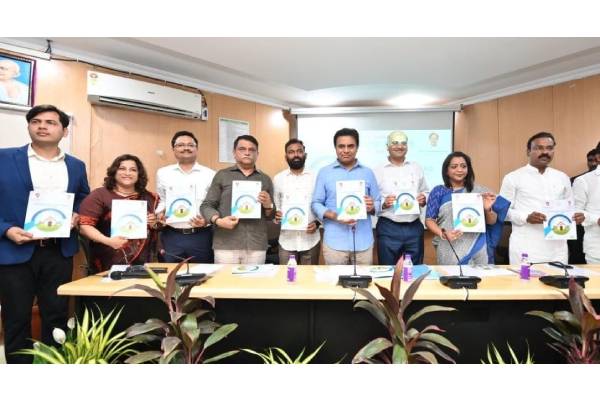Telangana on Monday launched Cool Roof Policy, thus becoming the first state in the country to come out with the initiative aimed at reducing the urban heat island impact and to bring down energy consumption.
Minister for municipal administration and urban development K.T. Rama Rao launched the policy with a vision to make the state a more thermally comfortable and heat resilient.
The policy has come into effect from April 1 this year and is already incorporated with building permissions applications.
Telangana Cool Roof Policy 2023-28 suggests adoption of cool roof as a measure for implementation to build resilience against extreme heat. “We aim to be an eco-friendly state with reduced dependence on energy consumption for cooling,” he said.
The cool roof is now mandatory for all government, government-owned, non-residential and commercial buildings irrespective of the site area or built up area. Occupancy certificates will be issued only after ensuring compliance with the policy.
Cool roof application is mandatory for residential buildings that have a plot area of 600 square yards and above. However, for buildings that have plot area of less than 600 square yards, it is optional or voluntary.
Leading by example, minister Rama Rao personally got cool roof painting done for his house. He said that it is very beneficial.
He directed officials to explore awarding incentives to encourage builders and property owners to adopt cool roof policy guidelines.
A special training programme for builders and all those involved in the construction industry about cool roof products and their benefits will be conducted.
The minister revealed that the cost for cool roof painting or tiles would be Rs 300 per square metre.
The policy aims at developing an ecosystem of suppliers, trained man power, testing and materials to support implementation of cool roofs.
Cool roofs are painted with solar reflective paint, covered in white tiles or with white membrane. They are an easy and cost-effective way to help fight climate change by mitigating the urban heat island effect and reducing cooling demand.
A cool roof takes in less heat from the sun than regular roofs. It stays relatively cool in the sun by reflective sunlight to minimise solar absorption and emitting thermal radiation to help dissipate solar heat gain. Cool roofs reflect around 80 per cent of the sunlight as compared with 20 per cent from regular roofs.
Experts say cool roofs can help keep indoor temperatures 2.1-4.3 degree lower than households with traditional roofs.
Cool roofs need limited maintenance and can save 20 per cent in energy costs and can increase the longevity of the roof beneath them.
Under the cool roof policy, Telangana has set a target of 5 square kilometer area for Hyderabad urban agglomeration and 2.5 square kilometer for the rest of the state in 2023-24. This will be doubled every year to reach 200 square kilometer in Hyderabad and 100 square kilometer in the rest of the state by 2028-29.
A total of 300 square kilometers of cool roof in the entire state is expected to help save 600 million units of energy per year.


































